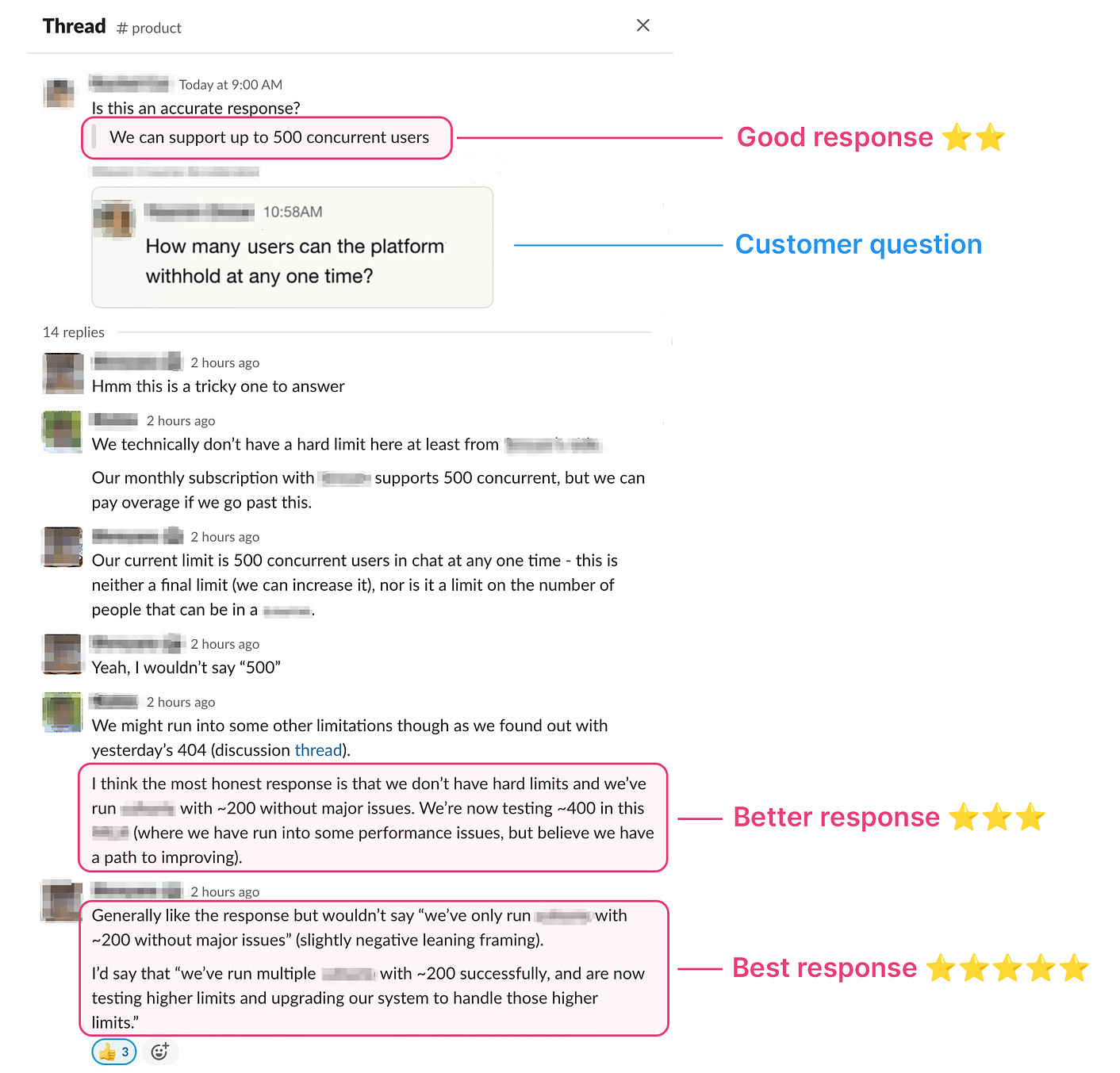Wes Kao - The unspoken skill of finesse
The unspoken skill of finesseWhat finesse looks like, why it matters, and how to develop it for yourself and your team👋 Hey, it’s Wes. Welcome to my weekly advice column on managing up, driving growth, and standing out as a high performer. If my approach resonates with you, apply to work with me for 1:1 executive coaching or bring me on as a keynote speaker. Hit reply or message me to see if we’re a fit. Today, we’re going to talk about the leadership trait of finesse.
Read time: 10 minutes Many successful operators and leaders have what others would call “finesse.” It’s an important skill, especially for senior leaders and operators who want to continue to advance. When people talk about finesse, there’s an air of je ne sais quoi, an abstract sense of “you know it when you see it.” There’s this innate feeling that some people have finesse while others don’t. As you progress in your career, finesse becomes increasingly important. If you lack it, your CEO can’t put you in front of your most important customers. They can’t trust that you’ll be able to handle delicate, high-stakes issues. This stalls your growth and impacts your ability to add value. Given how important finesse is, there’s shockingly little written about it. I believe if we can dissect it, we can have more objective conversations about who has finesse, who gets rewarded for having it, and how to develop it in yourself and others. But first, we need to understand what it is. Part I: What is finesse?For years, I’ve been fascinated with the topic of good judgment. You could give 10 operators the same primary data, and they’d potentially come up with 10 different recommendations of varying quality. This is because deciding what to do and what to say requires judgment. And folks have varying degrees of judgment depending on their task-relevant maturity. I see finesse and judgment are cousins. I’m still shaping how I’d define finesse, but for now I’ll say:
I’m sure others might define it differently, and I welcome building on what I have here. For the purpose of this essay, I’m mainly looking at finesse through the lens of interacting with customers, i.e. one the most important stakeholders. Finesse requires good judgment because you need to:
You might look at this list and think, How could anyone possibly do all this, especially in near real-time, while staying present with whoever they’re with? Finesse might come more naturally to some, like a personality trait—just like some people are more attuned to picking up clues and micro-expressions, or seem to always know what to say to make someone feel seen. But luckily, it can be learned. As with anything that seems like magic from afar, I believe it’s a skill that can be intentionally dissected, honed, and practiced. So let’s go to an example of finesse I’m excited to show you. Part II: Same question, three different levels of finesseOne of the harder parts of my newsletter is showing you redacted examples, where after I redact, the point still shows through. After redacting, many things no longer make enough sense to be valuable. Which is why I was straight-up giddy when I came upon this example for you. Check out this Slack thread with three team members and how they each replied to a customer question. The customer asked:
On the surface, this seems like a simple question with a simple answer. There’s only one way to reply, right? Wrong. Here are three people—a mid-career operator, senior leader, and C-level executive—answering the same question in different ways. All three answers are pretty good, but they get progressively better: Here’s how I would dissect and rate their responses:
One of the things I like to do is dissect what seems simple on the surface, but upon a further look, offers more levers than you originally thought. More levers equals more opportunity to drive value. As you can see, Person C noticed levers that Person A and Person B missed. A bell curve of finesseThe range of finesse in the replies is a microcosm of the difference in skill and judgment that could be happening throughout your organization, in minor and not-so-minor ways. The example above wouldn’t be that interesting if it were an isolated incident. But I’ve seen examples like this countless times, and it illustrates the varying levels of savvy among team members. Your team members are executing in hundreds of micro-interactions with coworkers, partners, leads, and customers on a weekly basis. This is slack in the system that, if removed, is all upside. You’ve likely seen examples like this in your own team, but it’s hard to pinpoint. For example, a more skilled (often more senior, but not always) operator shares their point of view and it just makes sense. It’s just… better than what other people said. But it’s hard to put your finger on what made their input more insightful and more right. Every leader should actively look for opportunities to teach their team judgment. If you’re not doing this, you’re barely scratching the surface on what “learning on the job” means for your team. You need to teach them to “see” how you see, and notice what you notice. Explain the “why” behind what you said or did, or the “why” behind your feedback. When someone on the team displays finesse, point it out. Let everyone learn from it. Over time, your team will improve their ability to pick up on what you pick up on, and eventually, to make the judgment calls you would have made. I believe doing this, regularly and with gusto, is how you create a culture of high standards and dramatically improve your team’s chances of winning. Part III: The best ways to develop finesse1. Learn from your actual day-to-day workI believe it’s almost impossible to learn finesse purely in theory. The way to learn finesse is by thinking more deeply about the specific, real-world examples you encounter day-to-day. Trying to learn finesse in human interactions, without actually interacting with other humans, is like trying to be an Olympic water polo player from your desk. You learn when you get in the water, flail around, and start to realize what you don’t know you don’t know. Then gradually, you keep at it and you fill in the blanks, and you get better. For example, let’s say you want to have more finesse when interacting with customers. There are times when you might want to ignore your customer’s question altogether, and instead, answer the question you think they should be asking. This sounds extreme, but good salespeople and founders do this all the time. Marc Randolph, co-founder of Netflix, talks about the skill of answering whichever question you want to answer. He said,
This isn’t only about projecting confidence and knowing this tactic exists. It takes judgment to know when to do this, and finesse to execute well in real-time. I can’t tell you whether you should use this tactic without getting more information. Why? Because I don’t know enough about you, your personality, your skill level to pull it off, who the other person is, whether they’d balk or appreciate you doing this, and other important context. There are too many variables to think about finesse in abstract terms. Focus on learning from real-life scenarios you’re encountering at work. 2. Pay attention to your self-awareness and situational awarenessOne of the first things you can do is to become more aware of times that could benefit from finesse. At first, you might see opportunities as black-and-white, when often they are not. So simply acknowledging the range of outcomes, and your ability to influence those outcomes, is helpful. For example:
This is why I find it so rewarding to work with my 1:1 executive coaching clients. We get to work on a real situation, and strategize how to best add value to and appeal to real individuals (their CEO, direct reports) who have different personalities, worldviews, motivations, etc. You can practice this with a trusted friend, as long as you believe they would notice things you might miss and you trust their judgment. 3. Become a keen observer of what’s around youHere are other ways to improve your finesse, most of which are small steps you can start doing today:
4. Don’t let your ego get in the wayDon’t let your ego prevent you from getting input that will help you improve your finesse. Let others give you feedback, preferably in public channels where your coworkers can learn too. If Person A hadn’t shared their initial proposed answer in a public channel, the rest of the company wouldn’t have seen the improved versions of the response. The end result was better because of collaboration and iteration—it would have been a shame for everyone to miss out on that learning. We can all improve our finesse in various situations, so let your manager and peers be honest and direct. You’ll be able to add more value, and take this newfound level of finesse with you wherever you go next. There are different types of finesse, and different occasions that benefit from finesse. Keep an eye out for them in your daily work—they are all free opportunities to learn as an individual and as a team. Give yourself and your team the gift of learning from specific examples you can all look at in front of you. As coworkers, you have intense amounts of shared context that you’ll never have from a book, course, coach, or anything outside your company. Take full advantage of this opportunity to learn from each other. If my approach resonates with you, here are three more ways I can help:
Thanks for being here, Wes PS If you’re as excited about the topic of finesse as I am, here are posts on how to improve your judgment for common workplace situations: |
Older messages
How to share your point of view (even if you’re afraid of being wrong)
Wednesday, April 17, 2024
Sharing your point of view is one of the best ways to add value. So why do so many high performers hold back? Here's how to overcome this mental block so you can speak up and stand out. ͏ ͏ ͏ ͏ ͏ ͏
How I sharpen my mental models over time
Saturday, April 13, 2024
Break your own rules once in a while to understand what's true for you now, not what was true in the past. ͏ ͏ ͏ ͏ ͏ ͏ ͏ ͏ ͏ ͏ ͏ ͏ ͏ ͏ ͏ ͏ ͏ ͏ ͏ ͏ ͏ ͏ ͏ ͏ ͏ ͏ ͏ ͏ ͏ ͏ ͏ ͏ ͏ ͏ ͏ ͏ ͏ ͏ ͏ ͏ ͏ ͏ ͏ ͏ ͏
When to disagree and commit
Wednesday, April 3, 2024
Questions to ask yourself to decide whether to keep debating, or relent. ͏ ͏ ͏ ͏ ͏ ͏ ͏ ͏ ͏ ͏ ͏ ͏ ͏ ͏ ͏ ͏ ͏ ͏ ͏ ͏ ͏ ͏ ͏ ͏ ͏ ͏ ͏ ͏ ͏ ͏ ͏ ͏ ͏ ͏ ͏ ͏ ͏ ͏ ͏ ͏ ͏ ͏ ͏ ͏ ͏ ͏ ͏ ͏ ͏ ͏ ͏ ͏ ͏ ͏ ͏ ͏ ͏ ͏ ͏ ͏ ͏ ͏ ͏ ͏
"Insecure vibes" are a self-fulfilling prophecy
Wednesday, March 27, 2024
When you feel nervous, you might give off subconscious signals that make people more suspicious. Get rid of insecure vibes—and your writing, meetings, and pitches will become stronger. ͏ ͏ ͏ ͏ ͏ ͏ ͏ ͏
Managing up: 11 principles for getting better feedback
Wednesday, March 20, 2024
The truth about why your manager isn't giving you more feedback--and what to do about it. ͏ ͏ ͏ ͏ ͏ ͏ ͏ ͏ ͏ ͏ ͏ ͏ ͏ ͏ ͏ ͏ ͏ ͏ ͏ ͏ ͏ ͏ ͏ ͏ ͏ ͏ ͏ ͏ ͏ ͏ ͏ ͏ ͏ ͏ ͏ ͏ ͏ ͏ ͏ ͏ ͏ ͏ ͏ ͏ ͏ ͏ ͏ ͏ ͏ ͏ ͏ ͏ ͏ ͏
You Might Also Like
🚀 Ready to scale? Apply now for the TinySeed SaaS Accelerator
Friday, February 14, 2025
What could $120K+ in funding do for your business?
📂 How to find a technical cofounder
Friday, February 14, 2025
If you're a marketer looking to become a founder, this newsletter is for you. Starting a startup alone is hard. Very hard. Even as someone who learned to code, I still believe that the
AI Impact Curves
Friday, February 14, 2025
Tomasz Tunguz Venture Capitalist If you were forwarded this newsletter, and you'd like to receive it in the future, subscribe here. AI Impact Curves What is the impact of AI across different
15 Silicon Valley Startups Raised $302 Million - Week of February 10, 2025
Friday, February 14, 2025
💕 AI's Power Couple 💰 How Stablecoins Could Drive the Dollar 🚚 USPS Halts China Inbound Packages for 12 Hours 💲 No One Knows How to Price AI Tools 💰 Blackrock & G42 on Financing AI
The Rewrite and Hybrid Favoritism 🤫
Friday, February 14, 2025
Dogs, Yay. Humans, Nay͏ ͏ ͏ ͏ ͏ ͏ ͏ ͏ ͏ ͏ ͏ ͏ ͏ ͏ ͏ ͏ ͏ ͏ ͏ ͏ ͏ ͏ ͏ ͏ ͏ ͏ ͏ ͏ ͏ ͏ ͏ ͏ ͏ ͏ ͏ ͏ ͏ ͏ ͏ ͏ ͏ ͏ ͏ ͏ ͏ ͏ ͏ ͏ ͏ ͏ ͏ ͏ ͏ ͏ ͏ ͏ ͏ ͏ ͏ ͏
🦄 AI product creation marketplace
Friday, February 14, 2025
Arcade is an AI-powered platform and marketplace that lets you design and create custom products, like jewelry.
Crazy week
Friday, February 14, 2025
Crazy week. ͏ ͏ ͏ ͏ ͏ ͏ ͏ ͏ ͏ ͏ ͏ ͏ ͏ ͏ ͏ ͏ ͏ ͏ ͏ ͏ ͏ ͏ ͏ ͏ ͏ ͏ ͏ ͏ ͏ ͏ ͏ ͏ ͏ ͏ ͏ ͏ ͏ ͏ ͏ ͏ ͏ ͏ ͏ ͏ ͏ ͏ ͏ ͏ ͏ ͏ ͏ ͏ ͏ ͏ ͏ ͏ ͏ ͏ ͏ ͏ ͏ ͏ ͏ ͏ ͏ ͏ ͏ ͏ ͏ ͏ ͏ ͏ ͏ ͏ ͏ ͏ ͏ ͏ ͏ ͏ ͏ ͏ ͏ ͏ ͏ ͏ ͏ ͏ ͏ ͏ ͏ ͏ ͏ ͏ ͏
join me: 6 trends shaping the AI landscape in 2025
Friday, February 14, 2025
this is tomorrow Hi there, Isabelle here, Senior Editor & Analyst at CB Insights. Tomorrow, I'll be breaking down the biggest shifts in AI – from the M&A surge to the deals fueling the
Six Startups to Watch
Friday, February 14, 2025
AI wrappers, DNA sequencing, fintech super-apps, and more. ͏ ͏ ͏ ͏ ͏ ͏ ͏ ͏ ͏ ͏ ͏ ͏ ͏ ͏ ͏ ͏ ͏ ͏ ͏ ͏ ͏ ͏ ͏ ͏ ͏ ͏ ͏ ͏ ͏ ͏ ͏ ͏ ͏ ͏ ͏ ͏ ͏ ͏ ͏ ͏ ͏ ͏ ͏ ͏ ͏ ͏ ͏ ͏ ͏ ͏ ͏ ͏ ͏ ͏ ͏ ͏ ͏ ͏ ͏ ͏ ͏ ͏ ͏ ͏ ͏ ͏ ͏ ͏ ͏ ͏ ͏
How Will AI-Native Games Work? Well, Now We Know.
Friday, February 14, 2025
A Deep Dive Into Simcluster ͏ ͏ ͏ ͏ ͏ ͏ ͏ ͏ ͏ ͏ ͏ ͏ ͏ ͏ ͏ ͏ ͏ ͏ ͏ ͏ ͏ ͏ ͏ ͏ ͏ ͏ ͏ ͏ ͏ ͏ ͏ ͏ ͏ ͏ ͏ ͏ ͏ ͏ ͏ ͏ ͏ ͏ ͏ ͏ ͏ ͏ ͏ ͏ ͏ ͏ ͏ ͏ ͏ ͏ ͏ ͏ ͏ ͏ ͏ ͏ ͏ ͏ ͏ ͏ ͏ ͏ ͏ ͏ ͏ ͏ ͏ ͏ ͏ ͏ ͏ ͏ ͏ ͏ ͏ ͏ ͏ ͏ ͏ ͏ ͏ ͏ ͏



